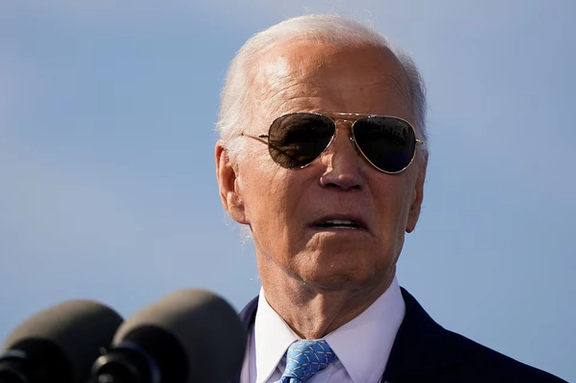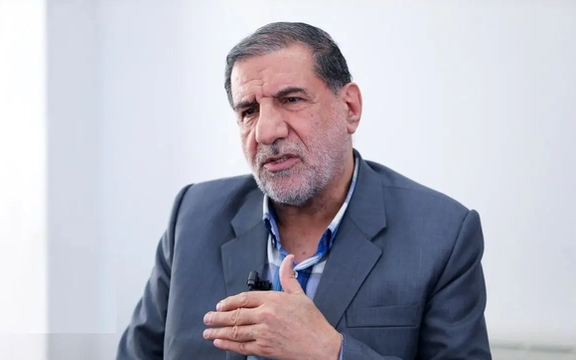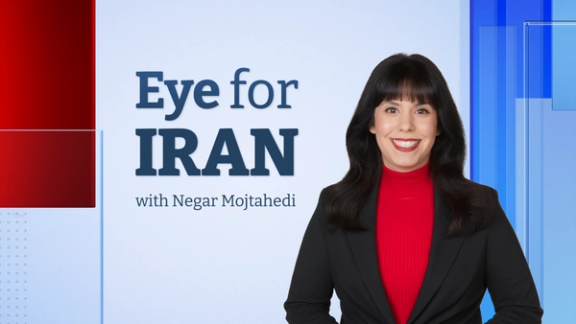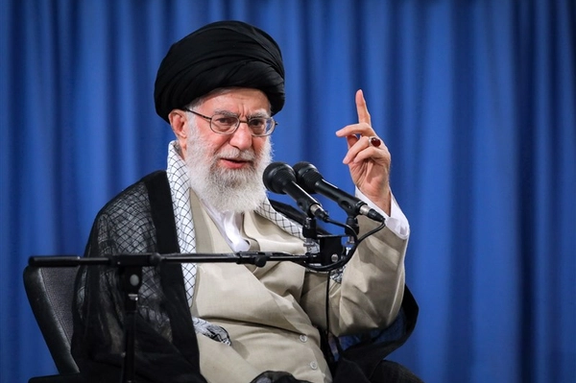Biden extends US national emergency on Iran

President Joe Biden on Friday renewed the 1979 US national emergency with respect to Iran, pursuant to the International Emergency Economic Powers Act.

President Joe Biden on Friday renewed the 1979 US national emergency with respect to Iran, pursuant to the International Emergency Economic Powers Act.
The national emergency was announced on November 14, 1979 when radical students in Tehran seized the US embassy and took hostage dozens of diplomats, staff and guards.
The decision by then-president Jimmy Carter was meant “to deal with the unusual and extraordinary threat to the national security, foreign policy, and economy of the United States constituted by the situation in Iran.”
In renewing the national emergency Biden said, “Our relations with Iran have not yet normalized, and the process of implementing the agreements with Iran, dated January 19, 1981, is ongoing. For this reason, the national emergency declared on November 14, 1979, and the measures adopted on that date to deal with that emergency, must continue in effect beyond November 14, 2024.”
In addition to the 1979 declaration, a separate national emergency was declared on March 15, 1995, addressing Iran's actions related to terrorism and weapons proliferation. This emergency has also been renewed annually, with the latest extension on March 12, 2024.
These declarations enable the US to implement comprehensive sanctions against Iran, aiming to curb its nuclear ambitions, support for terrorism, and other activities deemed threatening to international stability.

Iran’s Supreme National Security Council (SNSC) has authorized a military strike against Israel, aiming to intensify its response to recent escalations, according to Esmail Kowsari, a member of Iran’s parliament.
Kowsari, a former IRGC general, added that the response would be much harsher than the October 1 missile barrage that saw Iran launch nearly 200 missiles at targets in Israel.
“While certain government officials may believe we should not retaliate, these individuals, whether within or outside the government, do not make the decisions… This decision for a military response to the Zionist regime was made by the SNSC. Almost unanimously, or rather all members of the SNSC have agreed on a military response by Iran to Israel” he said in an interview with a Tehran website on Saturday.
On October 1, Iran launched its largest direct missile strike to date in the ongoing Iran–Israel conflict, which Tehran labeled Operation True Promise 2. The attack, involving more than 180 ballistic missiles fired in two waves, was presented by Iranian officials as a response to the assassinations of key figures allied with Iran, including Hamas leader Ismail Haniyeh in Tehran, Hezbollah leader Hassan Nasrallah, and Iranian General Abbas Nilforoushan. Israeli officials said to have intercepted most of the missiles, reporting minimal damage to infrastructure.
In retaliation for the strike, Israel responded on October 26 with airstrikes targeting Iranian missile facilities and air defense systems, resulting in the deaths of four Iranian soldiers and one civilian, according to Iranian sources.
“The plan, timing, and objectives of this action are left to the planners,” added Kowsari.
He also dismissed recent reports from the CNN, suggesting Iran might strike before the US elections, describing them as speculations.
“We make our own decisions and conduct actions, and no one has detailed information about the timing, location, or manner of the response.”
Regarding the collaboration between Iran’s military and regional resistance groups against Israel, Kowsari said that these groups may coordinate with Iranian forces ahead of the attack.
“The resistance groups in the region are aligned with our military forces in responding to the Zionist regime. Members of the Resistance Front may have input or suggestions before the operation, and this will be considered before the final decision. Therefore, Iran's military response to the Zionist regime, in coordination with the resistance forces, is certain, and we will definitely take action,” he added.
The Resistance Front refers to the alliance of armed militant groups sponsored by Iran, including Hezbollah, Hamas, the Palestinian Islamic Jihad, Houthis in Yemen, and Iraqi Shiite militias.

A female Iranian student was arrested on Saturday for removing her clothing in protest after reportedly being assaulted by security forces at Tehran's Islamic Azad University over improper hijab.
A video showing the student sitting in the courtyard of the university’s Science and Research Branch has gone viral on Iranian social media.
A university official later confirmed her arrest. "Following an indecent act by a student at the Science and Research Branch of the university, campus security intervened and handed the individual over to law enforcement authorities," Amir Mahjoub, Director General of Public Relations at Islamic Azad University, wrote on X. "The motives and underlying reasons for the student's actions are currently under investigation."
On the same day, Amir Kabir Newsletter, a student group on Telegram, reported details of the incident, saying that the student disrobed after being harassed for not wearing a headscarf and having her clothing torn by security forces.
During the student's arrest, she was subjected to severe physical assault, including her head striking either a car door or a pillar, which caused heavy bleeding. “Blood stains from the student were reportedly seen on the car’s tires,” the report noted.
Since the emergence of the Woman, Life, Freedom movement in Iran, sparked by the death of Mahsa Amini in September 2022 while in police custody over hijab violations, hardliners have intensified efforts to enforce strict dress codes for women. Despite widespread public defiance, government measures to reinforce mandatory hijab laws have escalated, resulting in the closure of businesses and the impoundment of vehicles associated with hijab offenses.
Project Noor, launched on April 13 to enforce hijab regulations, has led to a notable increase in the presence of police forces, Basij paramilitary units, and plainclothes officers in public spaces. Additionally, universities such as Alzahra University in Tehran have adopted facial recognition technology at entry gates, denying access to students whose appearance does not comply with strict hijab laws.
During his campaign, Iranian President Masoud Pezeshkian denounced the proposed hijab legislation as the "Darkness Plan" and pledged to end morality police patrols and the use of violence against women for non-compliance with hijab rules.
Nevertheless, in October, Iran's Guardian Council approved the controversial Hijab and Chastity bill, which is now under parliamentary review.

Iranian officials have raised the stakes, suggesting another strike on Israel. The United States has issued a stern warning against such a move, while Israel stands ready with an intensified response if it occurs. Is Tehran bluffing—or playing Russian roulette?
Ongoing confrontation with Israel—and the U.S.—carries grave risks, seemingly at odds with the Islamic Republic’s enduring commitment to survival. Iran's first Supreme Leader, Ruhollah Khomeini, declared that “preserving the system” is “the most obligatory of obligations.” For him, clerical rule was essential; without it, he argued, religion itself would perish. In this view, power is paramount, taking precedence even over religious edicts, let alone public welfare.
Khomeini’s dictum has been the cornerstone of Iran’s theocracy for four decades. It has led his successor, Supreme Leader Ali Khamenei, to step back from the brink before, and it may very well compel him to back off again in the weeks to come. But the voices coming out of Tehran this week say otherwise.
On October 31, the three most senior commanders of Iran’s Revolutionary Guards (IRGC) promised an attack on Israel. Even Khamenei’s typically reserved chief of staff joined their chorus, calling for a response that would leave the Israelis regretting their air strike. Hours later, Axios and the New York Times ran stories of an impending Iranian attack. “Likely before the US election,” one source was quoted saying.
Khamenei himself in a speech on Saturday indicted that Israel and the United States will face a harsh response to Israel’s October 26 air strikes.
It may be bluster—or another “True Promise,” the IRGC's code name for its two massive missile attacks against Israel this year. Both actions are hard to rationalize, especially the latest one on October 1, given the genuine risks involved. Decision-makers in Tehran understand their adversary isn’t just Israel, but a U.S.-backed Israel. They’re acutely aware of Iran’s struggling economy and the mounting frustration among Iranians. An all-out war could be suicidal, threatening to dismantle the very system meant to stand above all else.
Could this be a simple yet catastrophic miscalculation? Or do they possess knowledge that fuels a sense of invincibility? Perhaps they’re driven by an external influence, feeling they have no viable—or favorable—choice.
Iran and Russia have drawn ever closer in the past few years. A war in the Middle East may not be what Moscow wants, but it won’t be all bad news if an Iranian attack drags the US into yet another quagmire and divert its attention from Ukraine. An Iranian attack on Israel before November 5 could benefit Donald Trump. Leaders in Tehran may be wary of that, but Russia’s president Vladimir Putin likely doesn’t mind.
On Friday, the Pentagon ordered more bombers and warships to the Middle East, perhaps in anticipation of a new Iranian attack on Israel and a likely escalation.
In his Saturday speech, Khamenei cited “international logic” as a justification for an attack. Whether this implies aligning with shifting global power dynamics remains to be seen.
Iran’s belligerent messaging may be bluster. If it’s not—if it turns out to be yet another True Promise—then those calling the shots in Tehran may find themselves on a path they can’t back away from, one that serves Moscow’s interests more than their own.

Iran created proxies to protect the Islamic government and now they're engaged in a direct conflict with Israel to protect their proxies, leading to a failed strategy, said one former spokesperson for the government of Israel.
Eylon Levy, the former voice of the Israeli government during the October 7 Hamas invasion, discussed Israel's latest strike in Iran, and how Iran's failed strategy is impacting the next front in this seemingly never-ending saga on Eye for Iran.
Levy, who in his previous role attended high-level meetings with Israel’s top decision-makers, has a deep understanding of Israel’s strategic planning and calculations. He viewed Israel’s October 26 counterstrike as both powerful and effective in targeting Iran’s military capabilities, yet measured in its restraint.
Levy, who with his former job attended high level meetings with leading decision
Levy noted that understanding the Islamic Republic’s strategy is challenging, as he believes the government operates with a strong influence of theological motivations.
"I don't think it's unthinkable we could end up in spiral of escalation," said Levy.
He said the proxies Iran created to combat Israel and maintain their power in the greater region has proven to be a liability for Iran's leadership.
"Because Hamas' leaders went rogue on October 7th and invaded Israel in the hopes of sparking a regional war that has now dragged Iran into it. Iran is seeing direct Israeli air strikes which would have been unthinkable a while ago."
In light of Israel's resolve and the recent setbacks to its proxies, will Iran double down on its current objectives, or choose steps toward de-escalation?
Levy stated that the next move is up to Iran, with the ball now firmly in its court. Some Israeli parliament members have noted that Israel has yet to respond to Hezbollah's drone attack on Prime Minister Benjamin Netanyahu's seaside residence last month, with some even calling for a second retaliatory strike against Iran.
However, Iran has vowed to strike back against Israel with what they describe as a painful response for the October 26th air strikes.
Current intelligence indicates that Iran may be preparing an attack on Israel in coming days, according to multiple news reports.
Defense Secretary Lloyd Austin announced Friday that the US is sending additional bomber aircraft and Navy warships to the Middle East to bolster America's presence in the region.
Levy doesn't see an end to the conflict between Iran and Israel unless the current establishment is overthrown in Iran.
As an Israeli citizen who sheltered while Iran launched nearly 200 ballistic missiles on Oct 1, he understands that Iran's direct aggression is a red line for the government of Israel.
"That's not going to become the new normal in a way that we were told rockets from Hamas and Hezbollah were," said Levy.
"Oct 1 was a red line for them and they wouldn't allow Iran's direct ballistic missiles to be new normal, that was intention of Israel's response to uphold deterrence," he added.
As the world awaits to see what Iran's next move is, Levy points out that if people take Iran's leadership by their word, then a further escalation and potential for things to get out of control, could be happening soon.
For the full episode, you can watch it on Youtube or listen to it on Spotify, Castbox, Apple, Amazon or Spotify.

Iran’s Supreme Leader Ali Khamenei said on Saturday that the Islamic Republic of Iran is committed to preparing for confrontation with the United States and Israel through military and political measures.
“We are fully committed to preparing the Iranian nation in every necessary way to confront arrogance,” Khamenei said on Saturday, referring to the US and Israel. “Whether in terms of military readiness, weaponry, or political efforts, thank God, officials are actively engaged in these efforts.”
Iranian government-controlled media carried a uniform news item with the headline, "The United States and the Zionist regime will certainly receive a crushing response."
Since 1979, Iran's Islamic government has used the term "global arrogance" to describe the United States, conveying a meaning similar to imperialism.
Khamenei’s comments came during a speech to students on the anniversary of the 1979 attack on the US embassy in Tehran, a date remembered for the seizing of US diplomats and citizens and holding them hostage for 444 days.
Israel launched airstrikes on Iranian military targets on October 26 in response to missile attacks from Iran on October 1. Israeli airstrikes targeted missile facilities and air defense systems, resulting in the deaths of at least four Iranian soldiers and one civilian. Iranian officials have vowed to retaliate against Israel in the next few days.
“This is not merely about revenge; it is a logical movement, a confrontation aligned with religion, ethics, Sharia, and international laws. The Iranian people and the country’s officials will not show any hesitation or leniency in this regard. Be assured of this,” added Khamenei.
His words were echoed by former Iranian Foreign Minister Kamal Kharrazi and Khamanei’s advisor, who, in a recent interview, suggested that Iran’s military doctrine could shift if faced with an existential threat.
Kharrazi, now head of Iran’s Strategic Council on Foreign Relations, said, “We already have the technical capabilities to produce weapons; only a religious decree forbidding nuclear weapons prevents us from doing so,” referring to a ruling by Khamenei against nuclear arms.
IRGC Spokesperson Mohammad Naeini also on Saturday threatened that a firm response will be delivered to Israel’s attack.
"A decisive and firm response will be given to the new act of aggression by the enemy," he said.
"Israel's miscalculation is thinking that Iran fears direct confrontation and will leave military attacks unanswered," he added.
Israel's October 26 air strikes inflicted significant damage on Iran's air defenses and missile production facilities, the Wall Street Journal reported on Saturday, quoting American and Israeli officials. This has left the country vulnerable should it decide to launch a retaliatory attack against Israel in the coming days.
This time, Israel can operate with impunity, sending aircraft deeper into Iranian airspace and targeting nuclear facilities, additional military sites, or economic assets. An expert told the Wall Street Journal that Iran’s focus now is more on defending itself than on retaliating against Israel.